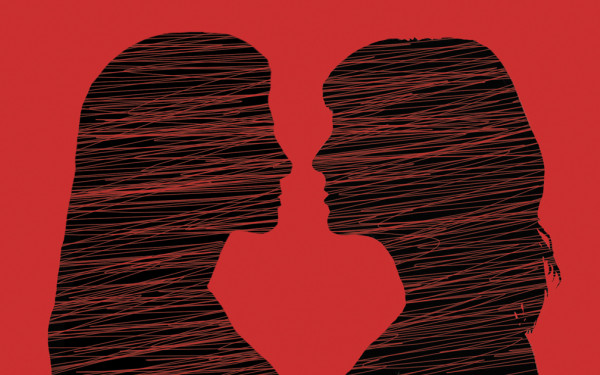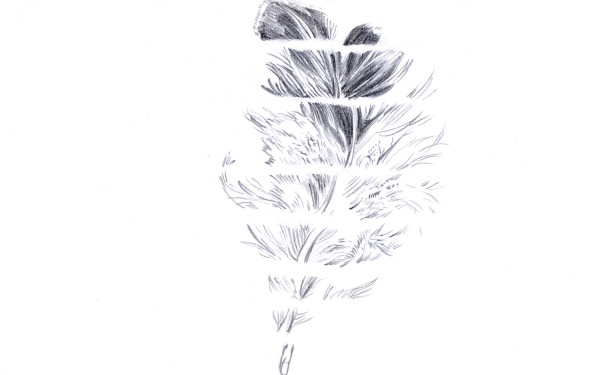Solidarity at the 11th Memorial March for Missing and Murdered Indigenous Women
Indigenous People and Non-Indigenous Allies Gathered In Support Tuesday
The memorial march, which launched from Berri UQAM metro, was organized by Missing Justice and the Centre for Gender Advocacy Concordia. Indigenous speakers like Ellen Gabriel, a well-known Mohawk activist from the Kanehsatà:ke Nation joined the crowd.
“Future generations should not have to endure what hundreds of years of genocide have inflicted on Indigenous people,” Gabriel said firmly to a wall of cameras and reporters. “We must stop the status quo of destroying the land. Because when you destroy the land, you attack the women who are the ones who pass on their culture, language, values.”
Gabriel joined a force of Indigenous activists who spoke at the march about the national inquiry into murdered and missing Indigenous women, launched in early August. Indigenous communities across the country are keeping a close eye on the inquiry, as the government continues to define its scope.
Video Kelsey Litwin
“The recommendations that the government is putting forth better be strong. It better be based on the recommendations of the families. It better be based on impartiality,” Gabriel said. “It needs to take a hard look at our justice systems.”
Wayne Robinson is a part of Native Montreal, a centre that provides services to the urban native community. He said he was moved to see so many people come out and support the movement. He echoed Gabriel’s concern towards the direction of the inquiry.
“I think a lot of people look at it and think that because we have an inquiry, the issue is solved, but we know that’s definitely not the case,” Robinson explained. “The inquiry is one of the tools we’ve been asking for as a movement, but now we need to see what exactly that inquiry is going to bring to us.”
While marching down a blocked-off St. Denis St., Gabriel spoke to The Link about the responsibility of the Canadian government.
“I think if Canada really wants to be a world leader, they have to start putting action behind the words they promise,” she said.
Speaking about the more recent mobilization of Indigenous nations in North Dakota, Gabriel said, “I think it’s sad and exciting at the same time.”
“We’re reminded that the colonial and imperialistic powers [have not] let go of their agenda, which is to eliminate us, so they can take our land and resources,” she said, referring to the tactics of aggression and intimidation by the North Dakota police force.
Gabriel refuses to give up hope. Drawn to the sound of deer-hide drums and traditional songs, she parted, saying, “We just have to be the wheel that keeps on turning.”
The march was led by representatives from Missing Justice who walked holding a banner that exclaimed, “Justice for Murdered and Missing Indigenous Women.”
“I think a lot of people look at it and think that because we have an inquiry, the issue is solved, but we know that’s definitely not the case.” – Wayne Robinson, Native Montreal member
Following the banner was a troupe of Indigenous women, most of whom are a part of Odaya, a native women’s drum circle. The women beat their drums and sang songs from different nations, drawing attention from onlookers.
The procession stopped at various landmarks, allowing for Indigenous voices like Justin Manyfingers to be heard. Manyfingers is Blackfoot from Alberta and identified as a man raised by Indigenous women.
“My grandmother was murdered in Calgary and left in the streets. My mother didn’t grow up with a mother,” Manyfingers said.
“Justin Trudeau, if you’re listening, you have the most white privilege power in this country. You made us a promise that you would bring justice to my grandmother, to many grandmothers, to our sisters, daughters,” he said. “It’s time that you help us.”
The streets filled with the smell of sage and sweet-grass, native medicine plants offered by elders throughout the night. Cheryl MacDonald-Darrow, a Mohawk woman from Akwesasne said she was happy to see participants from many cultures come to show their support.
“I don’t always see this large number of people come out to support us, unless it’s protesting or anger. It’s nice to be peaceful with people,” she said.
Outside of the Grand Bibliotheque, the crowd passed by protesters of the recently proposed pit-bull by-law. After reading the signs, the pit-bull supporters rushed over and lined the street, clapping, cheering and showing support.
The McGill Students for Amnesty International is holding a candlelight vigil in memory of the Indigenous women who have been murdered or gone missing on Oct. 12 at 6:30 p.m. The next memorial march will be held on Feb.14, 2017.

_(1)_900_600_90.jpg)



_600_375_90_s_c1.jpg)
3_600_375_90_s_c1.jpg)
